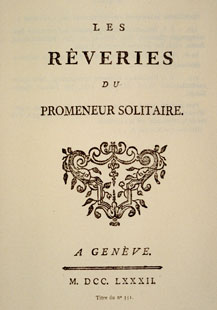Reveries of a Solitary Walker

Published in 1782.
|
|
| Author | Jean-Jacques Rousseau |
|---|---|
Reveries of a Solitary Walker (or Reveries of the Solitary Walker; French: Les Rêveries du promeneur solitaire) is an unfinished book by Genevan philosopher Jean-Jacques Rousseau, written between 1776 and 1778. It was the last of a number of works composed toward the end of his life which were deeply autobiographical in nature. Previous elements in this group included The Confessions and Dialogues: Rousseau, Judge of Jean-Jacques. The book is divided into ten chapters called "Walks". The Eighth and Ninth Walks were completed, but not revised by Rousseau, and the Tenth Walk was incomplete at Rousseau's death. The first publication was in 1782.
The content of the book is a mix of autobiographical anecdote, descriptions of the sights, especially plants, that Rousseau saw in his walks around Paris, and elaborations and extensions of arguments previously made by Rousseau in fields like education and political philosophy.
Reveries of a Solitary Walker has been described as the most beautiful book composed by Rousseau, comprising a series of exquisitely crafted essays. It has been argued that each of the ten walks in Rousseau's book has a unique musical tonality combined with internal variations. "He struck a new romantic note by suggesting that the meditative spirit may always find in nature something responsive to its mood." Before Rousseau's book the word "reverie" had a negative connotation: a 1771 dictionary defined the word as "ridiculous imagination" or "anxieties and cares that preoccupy the mind." Through his book, Rousseau helped create a positive connotation for the word by reveling in experiences that circumvented conscious thought.
...
Wikipedia
